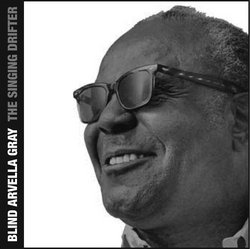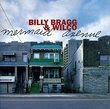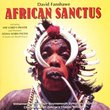| All Artists: Blind Arvella Gray Title: The Singing Drifter Members Wishing: 3 Total Copies: 0 Label: Conjuroo Recordings Original Release Date: 1/1/2005 Re-Release Date: 8/2/2005 Genres: Blues, Pop Styles: Chicago Blues, Acoustic Blues Number of Discs: 1 SwapaCD Credits: 1 UPC: 641444964628 |
Search - Blind Arvella Gray :: The Singing Drifter
 | Blind Arvella Gray The Singing Drifter Genres: Blues, Pop
The only album by Blind Arvella Gray, a nearly forgotten street singer who spent the latter part of his life performing folk, blues and gospel music at Chicago?s Maxwell Street flea market and at rapid-transit depots, is r... more » |
Larger Image |
CD DetailsSynopsis
Album Description The only album by Blind Arvella Gray, a nearly forgotten street singer who spent the latter part of his life performing folk, blues and gospel music at Chicago?s Maxwell Street flea market and at rapid-transit depots, is receiving a deluxe reissue. The album, The Singing Drifter, was originally released in 1972 on vinyl and fewer than 1,000 copies were sold. Unavailable for more than 30 years, the album is being released as a CD with full liner notes, extensive photography and three bonus tracks. The reissue kicks off the new Conjuroo Recordings label, an indie record company headed by Cary Baker, president of the music publicity company called conqueroo based in Sherman Oaks, Calif. Conjuroo is marketed by Emergent Music Marketing and distributed through RED Distribution. As a teenager in Chicago in the ?70s, Baker made several forays to Maxwell Street to watch Gray, and was even responsible for connecting the artist with the label that released Drifter, the Wilmette, Ill.-based Birch Records. Until it recorded Gray, Birch had specialized in traditional country artists of the WLS Barndance lineage including Doc Hopkins and Patsy Montana. Birch Records only released a handful of vinyl LPs, and had gone dormant by the inception of the CD. The Blind Arvella Gray album became a hot item, on collectors? want lists for years. Finally, in 2004, Baker developed a strong desire to reissue the recording. It was not easy to find Birch Records founder David Wylie, who maintained no web site, nor even an email address. To reissue the album, Baker set upon launching Conjuroo Records and enlisted the services of Grammy Award-winning art director Susan Archie of w0rld of aNarchie, who oversaw innovative packages for Revenant reissues by Charley Patton and Albert Ayler. Additionally, Wylie found three unreleased tracks, which have been added to the release. Arvella Gray (real name James Dixon) was born in Texas in 1906 and was blinded in the ?30s, possibly while holding up a bank, possibly in Peoria (he never told the story the same way twice). Arriving in Chicago in the ?40s, he brought the music of the cotton fields and chain gangs to the industrial North, proving an unheralded missing link to the origins of American folk music, blues and gospel. His repertoire included many standards, such as the chain gang standard "John Henry" and the traditional country song "More Pretty Girls Than One," while touching on the gospel tradition with songs like "Take Your Burden to the Lord and Leave it There." He accompanied himself on slide National Dobro--an instrument that was later sold on eBay. His fans included Bob Dylan, whose 1961 song "He Was a Friend of Mine" was said to have been borrowed from Gray. Arvella Gray died in Chicago in 1981. "My father took me to the Maxwell Street flea market to show me where his Eastern European immigrant parents had shopped in the ?30s and ?40s," says Baker. "In the ensuing years, it had become a hotbed for blues artists including Muddy Waters and Big Walter Horton, whose music was heard under the din of CTA buses and flea market hawkers on bullhorns augmented by the aroma of Polish sausages and onions grilling nearby. By the time I visited, Gray was among a handful of surviving buskers who continued to hold forth on Sunday mornings. I was taken by the unique sound and authenticity of his music. In historical perspective, Gray?s wailing slide Dobro stands in a category with Hound Dog Taylor, R.L. Burnside or Junior Kimborough -- wild, unruly and imperfect. This album quietly slipped between the cracks and it is my privilege and honor to turn a new generation on to this unforgettable street singer." Similarly Requested CDs
|
CD ReviewsSurprising (and surprisingly obscure) Chicago street blues hyperbolium | Earth, USA | 10/23/2005 (4 out of 5 stars) "Given the rabid nature with which blues fanatics scour archives for rare material, it's surprising that this album has remained unreissued since its 1973 release. Gray's busking on the streets of Chicago, and his appearance at the first University of Chicago folk festival certainly made him known to roots scholars, but the limited pressing and distribution (a scant 1000 copies!) of his sole LP, and the limited range in which he toured relegated Gray and his superb recording to be known only by the most ardent blues hounds. Luckily, one of the album's original instigators woke up one morning with the notion to reissue it on CD, and together with the session's original producer they've returned this vital work to print. Gray was among the many who migrated to Chicago in the early part of the 20th century, bringing along the blues, gospel, field hollers, and work songs of their native South - Texas, in this case. He learned to play National Steel guitar, employing a slide to make up for two missing fingers on his left hand. In both his playing and singing one can hear the craft of a street musician, performing with the sort of joyful abandon and resonant voice that ropes passersby into an impromptu listening circle. He wields his steel bodied guitar like a ten pound hammer for an epic 7-minute version of "John Henry," singing rarely heard verses augmented with an original about Gray's own Maxwell Street neighborhood. A part of Gray's artistry was undoubtedly his physical presence on the street corners of Chicago, amid the urban buzz of the surrounding streets. But his guitar and voice convey the mesmerizing core of that experience - one that's still alive at street fairs and on subway platforms (albeit without Gray's firsthand migratory link to Southern origins). This CD reissue was remastered from vinyl, with a few minor pops and clicks that create the warmth of a transcription. Four listed bonus tracks (remastered from tape) are augmented by an untitled fifth selection. [©2005 hyperbolium dot com]" It just gets better while you listen Marcus Aurelius | PA USA | 12/23/2007 (5 out of 5 stars) "About 35 years ago I made my first pilgrimage to Chicago in part to hook up with my first love and more importantly to hear the blues up close and personal. I tried to hear Arvella on Maxwell Street, but despite what it said in The Reader, he wasn't playing that one day I had set aside to try and catch him. Although the first love petered out, the true love is still there, and I recently came across this cd. Admittedly after the first track made me think that I had stumbled onto the wrong Blind Arvella Gray, the cd just picked up from there--the songs get more bluesy, the slide work more gutsy, and the experience made me glad that this lifetime gave me enough days to finally hear Arvella sing."
|

 Track Listings (14) - Disc #1
Track Listings (14) - Disc #1
